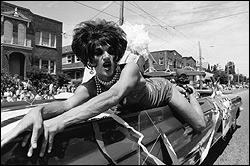Charlette Lefevre does not mince words: “The pride march has been stolen. It’s been quietly stolen.” The target of her ire is the all-volunteer Seattle Pride Committee (SPC), the tiny organization that runs each June’s pride march and rally on Capitol Hill. Despite an enormous outcry this summer from Capitol Hill businesses and the lesbian-gay-bisexual-transgendered (LGBT) community, the SPC is now in negotiations with Seattle Center to move the 2006 march and rally off Capitol Hill. The weekend festival would be held on Seattle Center grounds, with the Sunday march winding through downtown.
In July, after this year’s march drew a record 150,000 attendees, the SPC announced as a done deal a decision to move to Seattle Center in 2006. The rationale, according to board members, was twofold: that the march had outgrown Volunteer Park, its traditional destination, and that the LGBT community in metropolitan Puget Sound was far broader than the “gay ghetto” of Capitol Hill. A march through downtown would better represent where lesbians and gays belong, the thinking went.
In response, scores of people testified against the move at a July community meeting, and Carl Medeiros, owner of Panache on Broadway, presented a petition with more than 8,000 signatures urging the SPC to keep the march on Capitol Hill. Speakers cited the long history of the march on the hill, the safety factor for queers marching in public in a gay-friendly neighborhood, and the relative sterility of the Seattle Center grounds.
It didn’t matter. Despite promising to consider the community’s concerns, the SPC has continued with plans to move the march. Lefevre, director of Broadway’s nonprofit Museum of the Mysteries, has emerged as the informal leader of community activists opposed to the move. She ticks off a long list of grievances with the SPC, including financial conflicts of interest.
“I’m disgusted with them,” she says. “In all fairness, there needs to be a full audit. It’s a consumer nightmare.”
SPC board members did not respond to requests for an interview. But one of the problems seems to be that an important community institution has been entrusted to a handful of volunteers who can only do so much. Several seats on the SPC board are open, minutes have not been posted on the SPC Web site (www.seattlepride.org) since February 2004, and the board has not responded to Lefevre’s requests for financial statements.
It’s rather surprising that community institutions like the Seattle LGBT Community Center, the Gay and Lesbian Business Association, and the Broadway Improvement Association haven’t taken a more active role in the march. Without the involvement of such groups, the SPC board has been left free to seek support from national corporate sponsors and to move the march.
Regarding the prospective move, Lefevre says, “The committee is being deceptive. . . . It’s all about money. They want to charge.” Indeed, at this month’s public meeting, board members floated the idea of inviting Air America’s Janeane Garafalo next year as a featured speaker and charging festivalgoers to see her. Such an arrangement would be much easier at the gated Seattle Center.
Underlying much of the frustration, for Lefevre and other critics, has been the steady depoliticization of the pride march. At a time when LGBT rights are under steady attack nationally from the religious right, the tendency locally has been to treat the pride march as one big party. Ironically, moving the march off Capitol Hill would challenge that sense of complacency.
Safety isn’t necessarily the issue the critics think it is. I was on staff at 1987’s Gay and Lesbian March on Washington, D.C. That weekend, which saw 750,000 queers on Washington’s streets, remains one of the highlights of my life. We were everywhere, and the result was a sense of safety and exhilaration many of us had never experienced. When you’re many tens of thousands strong, nobody messes with you, no matter where you are.
If the pride march is downtown next year, in all likelihood it’ll be fine. The whole point, after all, is to celebrate diversity wherever we are. Having 150,000 queers downtown is a powerful statement, even if—especially if—it’s not quite as comfortable as marching down Broadway.
But there does seem to be an accountability problem at SPC. Lefevre hits it on the head: “If community organizations don’t do something, they’re negligent, because they know good and well what’s going on.”
Many LGBT leaders are reluctant to see such a public split in the community at a sensitive political time. If community members don’t want to see the march move, now is the time to contact the SPC (or show up at a meeting) and let them know. Another month or two and it’s likely to be a done deal.
If, as Lefevre charges, the pride march has been hijacked by a small group of friends, it won’t last. The institution is far stronger than any controversy over it. And even if the event becomes just another Seattle summer corporate block party, the soul of it will remain. After all, as Lefevre says: “You can’t control pride. You can’t commercialize it.”







